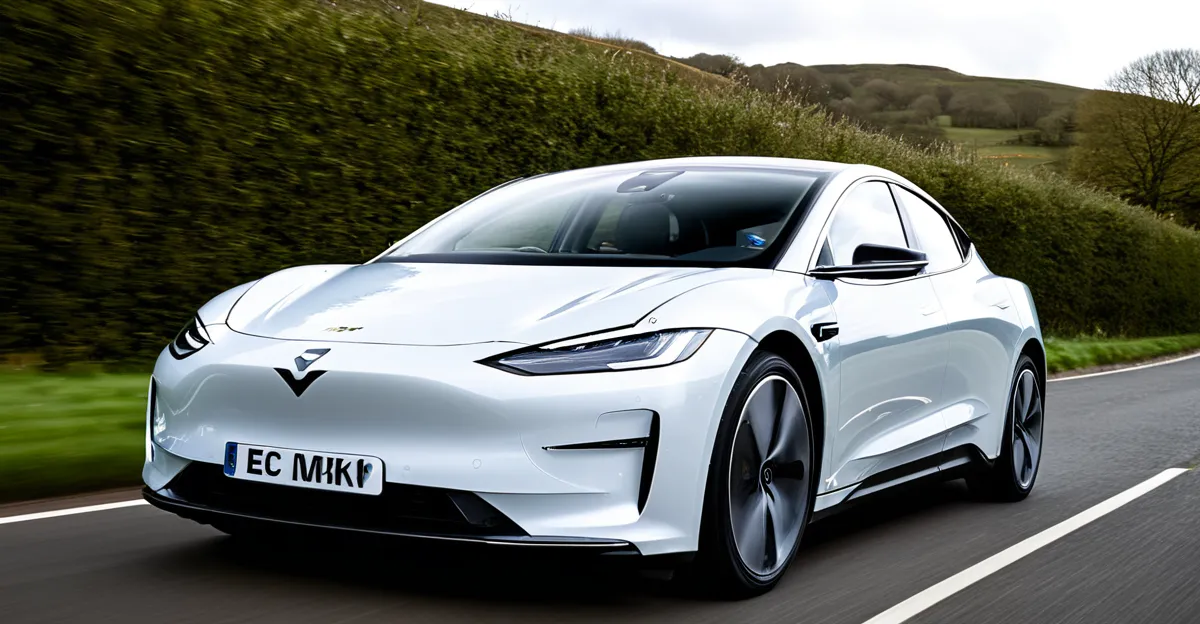Overview of Electric Vehicle Evolution in the UK
The evolution of electric vehicles (EVs) in the UK has been marked by significant advancements and innovations that have shaped their development and adoption. The historical timeline of electric vehicle introduction in the UK reveals a gradual yet profound transformation over the decades. From the early 20th century experiments to the present-day surge, the UK’s automotive history has been crucial in understanding the journey of electric car development.
Over the years, key technological innovations such as improvements in battery technology and charging infrastructure have driven the evolution of EVs. Innovations like the transition from lead-acid batteries to more efficient lithium-ion counterparts have enhanced their range and efficiency, thus making them more viable and appealing to consumers. Moreover, the establishment of a robust charging network across the UK has facilitated greater usage and convenience for EV owners, addressing one of the significant barriers to broader adoption.
Also to see : How Will Upcoming Technological Advancements Reshape the UK Automobile Landscape?
Significant statistics indicate substantial growth in electric vehicle sales and usage throughout the UK. Reports highlight how each year sees an increase in electric vehicle registrations, reflecting heightened consumer awareness and acceptance. Today, tens of thousands of electric cars are sold annually, a stark contrast to mere hundreds in the initial phases. This growth trajectory underscores the success of electric vehicle advancements and their rising importance within the UK automotive landscape.
Government Policies and Incentives
The UK government policies and incentives play a pivotal role in promoting electric vehicle adoption, shaping the trajectory of this transformative sector. A critical aspect of government action is the array of electric vehicle incentives designed to stimulate both production and consumption. These include grants for purchasing electric cars, tax breaks, and subsidies directed at reducing the initial cost barrier for consumers.
Also to read : How Will Electric Vehicles Transform the Future of Driving in the UK?
Environmental regulations further influence the automotive industry, compelling manufacturers to innovate towards more sustainable practices. Regulations such as CO2 emissions standards ensure that manufacturers produce vehicles that have minimal environmental footprints. These standards are aligned with the UK’s commitments to reduce carbon emissions and advance towards a greener future.
Government initiatives in this arena extend beyond financial incentives and regulatory frameworks. They encompass investments in charging infrastructure, ensuring that the necessary facilities are accessible and reliable for EV users across the nation. These initiatives are crucial as they address infrastructure challenges, thus facilitating the smoother transition to electric mobility.
The UK government’s commitment to this cause is compelling enough that traditional car manufacturers are increasingly investing in electric vehicle technologies. This shift is not only a response to regulatory pressures but also a transformation driven by strategic government support aimed at securing the UK’s position as a leader in the global electric vehicle market.
Technological Developments in Electric Vehicles
The advancement of electric vehicle technology has been a game-changer in the automotive industry, propelling the shift from traditional to electric vehicles. A pivotal area has been battery advancements, which have significantly affected vehicle performance and consumer uptake.
Leading technologies in electric vehicle battery design include the transition to lithium-ion and solid-state batteries. These types provide not only greater energy density but also improved charging speeds and extended lifespans. Modern batteries are now approaching a range and recharge ability that aligns more closely with consumer expectations, helping to overcome one of the main hesitations people have with switching to electric.
Additionally, advances in charging infrastructure have been crucial. The development of fast-charging stations and widespread network availability enhances convenience for drivers and promotes more extensive adoption. Fast chargers can replenish a vehicle’s battery much quicker than traditional setups, widening the feasibility of long-distance travel, a vital factor for consumer appeal.
Emerging innovations in electric vehicle performance include developments in autonomous driving features and improved energy efficiency systems, contributing to the appeal of EVs. Engineers and tech developers are continuously working to refine these technologies, ensuring electric vehicles remain at the forefront of automotive innovation and sustainability promises. These advancements reinforce EVs not only as a sustainable choice but increasingly as the superior technological option.
Impact on the UK Automotive Manufacturing Sector
The shift towards electric vehicle production has profoundly affected the UK automotive manufacturing sector, triggering a transformation in how vehicles are developed and produced. Traditional automotive manufacturers are now compelled to adapt their manufacturing processes to accommodate electric drivetrains and advanced battery technologies. This transition involves significant investments in new technologies and reconfiguring plant facilities to align with the needs of electric vehicle assembly.
Adaptations are necessary as manufacturers contend with the demands of producing lighter bodies, integrating complex electronic systems, and ensuring compatibility with eco-friendly power sources. Traditional manufacturers must either evolve their practices or risk falling behind as the industry moves increasingly towards electrification. To this end, companies have started prioritising electric models within their production lines, symbolising a crucial strategic redirection from conventional vehicles.
This manufacturing shift also impacts the future outlook for jobs within the sector. While opportunities for new job creation in electric vehicle production arise, there’s an undeniable need for current workforce upskilling. Manufacturers are tasked with balancing efficiency in transitioning roles, which involves investing in training programs to equip workers with knowledge about electric systems and innovative car components.
Although there are concerns over potential job losses in traditional manufacturing roles, the emergence of electric vehicle technologies offers a landscape ripe with opportunities for growth and development. Jobs related to battery production, software development, and charging infrastructure installation are surfacing as new career avenues, reshaping the UK’s manufacturing sector into a future-focused entity.
Employment Implications in the Electric Vehicle Landscape
The transition to the electric vehicle (EV) landscape is creating new employment opportunities while also reshaping existing roles within the automotive sector. As the industry progresses, there is a burgeoning demand for a workforce skilled in electric car development, positioning the UK as a potential leader in this advanced field.
Emerging Job Roles in the EV Sector
With the shift towards electric vehicles, new roles are emerging, particularly in battery production, electric drivetrain engineering, and charging infrastructure development. The rise of advanced technologies calls for expertise in software development and mechatronics, areas crucial for enhancing automotive performance. Such roles are essential for driving the continued success and advancement of electric vehicles.
Skills Required for the Transitioning Workforce
As the automotive industry pivots towards electrification, there is an emphasis on skills development to equip the current workforce for emerging challenges. Workers need training in electronics, renewable energy systems, and battery technology. Upskilling initiatives are vital to ensure that the transition is smooth, allowing employees to adapt to new manufacturing processes and technologies.
Potential Job Losses in Traditional Manufacturing
While new opportunities arise, there’s an undeniable risk of job losses in traditional automotive roles, as manufacturing processes evolve. Employees previously focused on internal combustion engines may find their skills becoming obsolete. However, strategic investments in training and skills development can mitigate these effects, allowing displaced workers to transition into roles aligned with electric vehicle production. This proactive approach is crucial for maintaining employment within the sector as the industry adapts to new demands and innovations.
Sustainability and Environmental Impact
Electric vehicles are hailed for their promise of sustainability and have been central to reducing overall carbon emissions—a vital comparison to traditional fuel-driven vehicles. Unlike petrol and diesel cars, electric vehicles (EVs) have no tailpipe emissions, significantly mitigating pollutants like nitrogen oxides and particulate matter, which contribute to urban air pollution. Additionally, as the UK’s energy grid continues to incorporate more renewable sources, the lifecycle carbon footprint of EVs diminishes further.
In enhancing sustainability within the electric vehicle supply chain, stakeholders are employing innovative strategies. These include developing resource-efficient battery recycling methods and encouraging the ethical sourcing of raw materials. Such efforts aim to minimise environmental footprints at every vehicle’s production and disposal stage. Industry leaders are also exploring second-life applications for EV batteries, revitalising them for energy storage solutions, boosting overall environmental efficiency.
Several case studies demonstrate successful implementations of green practices in electric mobility across the UK. For instance, London’s Ultra-Low Emission Zone (ULEZ) has driven increased EV adoption, significantly improving urban air quality. Meanwhile, initiatives like Manchester’s Clean Air Plan highlight strategic measures aimed at integrating zero-emission vehicles into broader public and commercial transport fleets. These examples underscore the compelling environmental benefits of electric vehicles, showcasing their potential to facilitate broader ecological goals and sustainability objectives.
Expert Opinions and Industry Insights
Delving into the electric vehicle future, it’s clear that industry experts envision a landscape rich with electric vehicle advancements. These projections are based on growing market data and shifts in consumer behaviour. Experts, such as automotive analysts, highlight an upward trend in electric vehicle adoption driven by increasing public awareness and changing regulations. This shift signals a broader acceptance of EVs as a sustainable transportation solution.
Industry expert analysis reveals that one of the pivotal opportunities lies in the development of battery technology and charging infrastructure. Successful scaling and integration of these elements are seen as vital to meeting consumer expectations for range and convenience. The forecasts underscore a positive trajectory, suggesting a solid potential for further industry innovation.
Market trends point to heightened consumer behavior towards eco-friendly alternatives, with analysts predicting a continued rise in electric vehicle sales. This surge is fueled by ongoing advancements in electric vehicle technology that enhance vehicle performance and appeal. Analysts also point to the strategic alignment of manufacturers with government incentives as a key driver in the EV market’s expansion.
Challenges, however, remain. Experts cite the need for significant investments in infrastructure and workforce retraining as potential hurdles. Addressing these challenges is crucial to tapping into the full potential opportunities that the electric vehicle sector offers. Ultimately, industry insights reveal the electric vehicle’s pivotal role in shaping a sustainable, future-oriented UK automotive industry.
Case Studies of Successful Electric Vehicle Implementations
The landscape of electric vehicle success stories offers a rich tapestry of case studies, illustrating the transformative impact on the automotive industry. Notable among these is the significant progress made by electric vehicle manufacturers like Tesla and the homegrown British company, Lotus Cars, known for integrating advanced technologies and sustainable practices into their production lines.
In UK cities, collaborative initiatives have spearheaded the successful adoption of electric vehicles (EVs). For instance, the city of London has set a benchmark with its comprehensive Ultra-Low Emission Zone, which incentivizes the shift to cleaner transport options. Similarly, regions such as Manchester have implemented strategic clean air plans, aiming to integrate zero-emission vehicles into public and commercial transport fleets, thus, showcasing practical industry best practices in urban mobility.
The impact of these success stories transcends individual sectors, demonstrating a nationwide shift towards electric mobility. By analyzing these examples, several key lessons emerge: effective government collaboration, robust charging infrastructure development, and fostering public-private partnerships. These elements are crucial in facilitating a more seamless transition to an electrified transport future.

